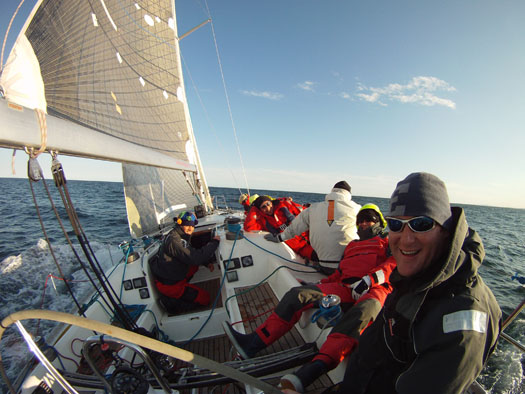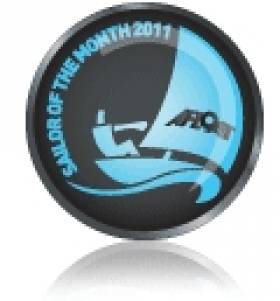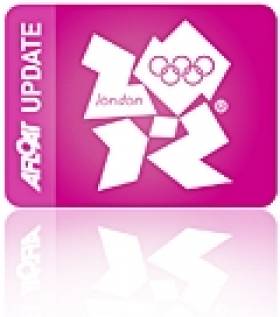Displaying items by tag: matt
Matt Davis is September's Sailor of the Month
The welcome revival of the offshore racing programme in the Irish Sea has been steered by Peter Ryan of the National Yacht Club in Dun Laoghaire, but without the enthusiastic crew like the Skerries squad, it just wouldn't happen.
Apart from the continuous effort of keeping a frontline offshore racer and all her equipment in sound working order, the demands on personnel for time in this crowded era can be quite exceptional. The logistics are formidable, as the regular cross channel ISORA programme is based on a willingness to alternate between starting points on the Welsh and Irish coast.

Matt Davis and crew on board Raging Bull in one of this year's ISORA races. Photo: Brian Carlin
For boats heading for an away start, it often involves an overnight passage beforehand. In the case of Raging Bull, all starts are away events, as the programme does not as yet take in Skerries. But we can hope that this will change in the future, as the nucleus of a Fingal offshore racing group develops around the Davis success.
With the summer of 2011's uneven weather, Raging Bull's crew had to be fit and ready to take full advantage of their boat's proven ability in rugged weather, while at the same time managing to turn in a respectable performance in light airs.
For the first time, the biennial Dun Laoghaire-Dingle race was recognized as an ISORA event, and Davis and his crew revelled in it. For much of the race they were the only boat mounting a significant challenge to the pace setter, Martin Breen's Reflex 38 Galway Harbour. Though the Skerries boat had to be content with the runner-up slot to the Galway boat in Dingle, they were first of all the ISORA participants, a top score which stood well to them when they continued with the Irish Sea programme right up until mid-September. Despite the limited size of the harbour, the maritime spirit of Skerries is manifesting itself in many areas of sailing, and Matt Davis's achievement is typical of the special Fingal fervour.
More on Matt's 2011 victory in Autumn Afloat magazine out next week!More ISORA News here
Offshore Success - Raging Bull's Winning Story by Matt Davis
Matt Davis was at the helm of the Sigma 400 'Raging Bull' that successfully defended the ISORA Title in September. Here the Skerries Sailor describes how he and his crew parepared for the defence of the coveted Wolf's Head Trophy
To retain our title as ISORA champions I knew there was going to be a lot of work involved as some of the ISORA fleet would be upgrading their boats over the winter months. I held a crew meeting early in 2011 to discuss with the crew what steps we would take and how we would go about defending our title. The meeting proved useful and we even got new crew members! The 2011 ISORA Series was to include the Dun Laoghaire to Dingle race – with the new scoring and this race being rated the highest it was important to plan to do well in this race. The season started off eventful with the craning-in in Skerries - we broke one of the lower spreaders and this was one week before the first race. So within a week we had the spreader replaced and were on the start line for the first race in the ISORA calendar.
The first race was the Dun Laoghaire to Holyhead race, which was to take in the M2 buoy. The wind was east to south-east, there was a lumpy sea with light winds in Dublin Bay and at times it was difficult to keep the boat going. The crew kept a watchful eye on sail trim and we worked our way out of the bay into a more-steady breeze. The wind kept building and top out in the 30 plus knots true. For an opening race it was tough going but the Sigma 400 liked the conditions. We tacked about five miles north of the M2 buoy and held that tack all the way to the finish at Holyhead. We started the season with a win, but in the back of my mind I knew that the weather had a lot to play in our victory and it was only matter of time when Stephen Tudor would get his new J109 up to speed.
We missed the second race, to the North Arklow buoy due to a faulty starter motor. Pwllheli to Wicklow was the next race that we got to the starting line. Dave Jackson and some of the crew delivered to boat to Pwllheli. On the week leading up to the race I had been tracking the weather and Peter Ryan was promising his famous 'weather window'. On the morning of the race the wind was whistling through the rigging and I knew it was going to be tough going to Bardsley. We got a good start and were one of the first boats off the line. About 20mins into the race we noticed the fleet were all rounding a mark way inshore of us, we had to bare off and reach for the mark, we lost a good 10mins to the leading boats. As we reached the halfway point we had climbed back up the leaderboard. English Mick was charging out in front and Tsunami was in second place on the water followed by Aztec, Jedi and Sgrech. One by one we passed Sgrech, Jedi and Aztec but there was no catching English Mick or Tsunami. We finished 3rd on the water and later found out we won overall on corrected time. We were delighted as it was such a close race.
Dun Laoghaire to Dingle was the next race. There were a lot of points going for this race and we had to do well. For most of the race I knew I wouldn't know where the competition was so I had to be sure of my tactics. Dave Jackson had been looking at weather and tides while Paul Ruigrok was getting the boat through its safety check. The D2D was a cold tough race. We got second over all but won the ISORA division. This now put us in good contention to retain the series.
A good result in the Lyver race would see us cement our position on the ISORA series. It was a tough race with the wind very light not getting above 5 knots. It was too light for the Sigma to pull away from the J109 of Stephen Tudor. Stephen won the Lyver race and we had to settle for second.
The night race to North India was another light race, which saw us hugging the shoreline with depths recorded under the keel of less than a meter, to try and stay out of the stronger tides. Once again we were not successful in getting a good result; our decision to go inshore did not pay off and when we rounded the buoy we found ourselves way down the fleet trying to work our way back into the race. The next day race was around Rockabill, again another poor result, this time not the weather gods but the crew gods did not help us, as we were a few people short. It was a great race with Lively Lady winning and only 3 min between the first 5 boats!
So the last race of the season - Pwllheli to Howth, this race was shortened due to bad weather and the race was to finish in Dun Laoghaire. We got a great start and were lying in second place until about halfway when we blew out our headsail. We lost a lot of time and had to sail in the wrong direction to help get the sail down. We were now fourth on the water and chasing Tsunami, Sgrech and Jedi. We fought hard to finish second on the water and were very happy to finish 3rd on corrected time. We had successfully defended our ISORA title! To win the ISORA Wolfs Head Trophy once is great but to do it again is something very special and I am delighted to thank the hard working crew of Raging Bull for all there support: Dave Jackson, Ross McMahon, Tracey Carey, David Boyle, Paul Ruigrok, Clodagh Whelan, Ben Malone, Paddy Dillon, Derek Fitzpatrick, Gavin Laverty, Donal Ryan and Emma Wilson.
It's a credit to the crew that have fought hard to help me retain the title and to anyone out there looking to try their hand in ISORA next season all I can say is please join the fun and come sailing! It's very competitive with a real family feel to it. Barry Hurley is trying hard to get the two-handed division going so ISORA has something for everyone. I'd like to say a huge thank you to Peter Ryan for reviving ISORA and bring it back to its former glory.
McGovern and Seaton Racing Hard in the 49er Dinghy


























































